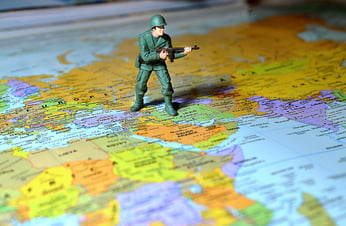Alex Vohr: Why We Plan
Businesses build annual plans to take them from where they are today to a desired end-state. End states are generally expressed in terms of revenues earned, EBITDA or growth achieved. Often, results at the end of the year fail by wide margins to match the plan’s expectations. Why is this? It’s because we live in a chaotic world where things we don’t anticipate occur with great frequency. What exactly does it mean to say the world is chaotic?
Chaos is defined in Webster’s as “behavior so unpredictable as to appear random, owing to great sensitivity to small changes in conditions.” In a practical sense, this means the world behaves in ways not directly attributable to linear cause and effect. Most simply stated, we’re living in a world where the future is not predictable.
So, what’s the point of planning if it means we’ll fail to get to where we want to be due to unpredictability and chaos? Helmuth von Moltke, the general who put into action the German plan for defeating France in World War I, is famously paraphrased as saying, “No plan survives first contact with the enemy,” which is true. It’s what he went on to say that is more powerful though. To paraphrase again, Moltke said, “plans that were possible before first contact are no longer possible, but things that were not previously possible are now possible. All a commander can do is keep the great goal in focus and adjust as he goes.”
Planning is valuable but the value of planning is not in the plan; it’s what is learned through the efforts of planning. Specific, the worthwhile products of planning done right are threefold. The first is an understanding of ourselves, the second is an understanding of the business environment to include the competition. The third is the identification of the “great goal,” or business objective, developed through detailed understanding and stated broadly enough to endure the daily unpredictability and chaos of the world. Let’s look at these three products of planning in detail.

Planning is the reconciliation of ends, ways and means where ‘ends’ are the goals you want to achieve and ‘means’ are the tools you possess to accomplish the ends. ‘Ways’ are how you plan to use the tools to accomplish the ends, or reach your goal. Sun Tzu, the great ancient Chinese war theorist, said, “know yourself and know your enemy and in a thousand battles you will never be in peril.” What does it mean to know yourself?
Knowing yourself is an intimate understanding of your business, the business means. What are the strengths and weaknesses of the people in your organization? How much capital can you invest, what are the strengths, weaknesses and limitations of your facilities and equipment? Knowing yourself is understanding your organization in detail. It’s understanding the tools you can use to reach the ends, or the goals you want to attain.
Knowing the business environment is as critical as knowing yourself.
Organizations typically spend all their time planning in a myopic bubble. They only think about what they are going to do without understanding the challenges of the business environment or what the competition is doing. How do organizations understand the environment? They study the business environment and the competition and hold focused discussions in planning sessions where the results of these studies are considered to discover and consider both threats and opportunities.
The third valuable product of planning is to identify Moltke’s “great goal.” Another term for great goals is objectives. Organizations design or identify objectives to be attained within a limited time. Most businesses have an annual plan and the great goal would be the business’s annual objective, developed as a reflection of detailed understanding and stated broadly enough remain viable in the changing daily environment.

When the military plans operations, each plan has a mission statement. That mission statement identifies the plan’s goal or objective. When the details of the actual plan fall apart in the openingsalvos of the chaos of combat, military professionals understand the overarching goal and are trained to exercise initiative. They adjust under fire to meet the objective. If business goals are thoughtfully identified, business capabilities understood, and the organization is in tune with the environment, people within the organization empowered to act can adapt in the same manner as the military in combat.
Plans themselves, generally considered the product of business planning, are of little value. How many times have you seen plans expressed in terms of monthly EBITDA goals or predictions of commercial success that are not even close after the first quarter? The value of planning “done right” is in what organizations learn about themselves, the environment and the competition. It’s in the enduring goals or objectives that good planning identifies. Recognizing these as the valuable products of the planning effort will underwrite agility when the business makes “first contact” with the competition and adapts amid chaos to win.
Who is Alex Vohr?
Alex Vohr provides insight and perspective on strategy, plans and operations for success in a chaotic environment. Alex currently is the head of logistics at New Fortress Energy with more than 28 years of experience in operational and strategic level logistics. Alex is a retired Colonel in the United States Marine Corps with 25 years of active service including combat, humanitarian assistance operations, and assignments as a planner, educator, and acquisition professional. In his last assignment, Alex served as the Director for Logistics, U.S Southern Command, responsible for all U.S. military logistics in Central and South America. He holds multiple advanced degrees and is a 1988 graduate of the United States Naval Academy.






